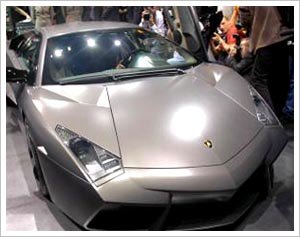Frankfurt Motor Show to highlight new world of electric cars
 - A clean-drive electric future for the motor car tops the agenda at this year's Frankfurt Motor Show with manufacturers presenting numerous battery-driven concepts, research vehicles and E-Vehicles of existing models but motorists might have to wait several more years before they can buy them in a showroom.
- A clean-drive electric future for the motor car tops the agenda at this year's Frankfurt Motor Show with manufacturers presenting numerous battery-driven concepts, research vehicles and E-Vehicles of existing models but motorists might have to wait several more years before they can buy them in a showroom.
The German government is hoping to boost development with 500 million euros (715 million dollars) in subsidies over the next three years to help bring one million electric vehicles on the road by 2020. But this remains a small figure compared to the 50 million cars on German roads today. Some car makers are perhaps too optimistically promising an affordable E-Vehicle in the next two years.
It is still a long way from the combustion engine and petrol stations to a completely new world of electric cars and loading sockets. New production methods have to be tried and tested and a completely new energy infrastructure needs to be put in place.
German climate and energy expert Professor Manfred Fischedick estimates a transition period of between ten and 20 years "from the current very early stage." If the energy for E-Vehicles comes from sustainable sources such as wind and solar it makes a lot of sense from a climate protection perspective, according to the expert, but he warns it would be dangerous to concentrate only on E-Vehicles.
Already research institutes are complaining that many resources are being channelled to E-Vehicle research rather than into other fields such as hydrogen-powered engines.
Most E-Vehicles on show in Frankfurt are small cars designed for city commuters travelling on average between 30 and 40 kilometres a day. The Daimler concern is going ahead with the small scale production of the second generation of electric-driven Smart microcars powered by lithium-ion batteries. BMW is currently testing a fleet of 600 electric Mini cars and Volkswagen is planning to mass-produce an E-Vehicle by the middle of the next decade.
Although huge strides have been made in battery technology a lithium-ion battery pack with a range of 200 kilometres still costs more than 10,000 euros - about three times as much than a combustion engine for a small car. In comparison modern diesel or petrol cars can travel between 800 and 1,000 kilometres on a single filling.
Affordable electric vehicles could therefore become the big thing in cities because they are pollution-free and silent. For bigger cars the manufacturers are looking at hybrid technology in combining a combustion engine with electric support engines. Several real stunners are heading for the Frankfurt event:
BMW will probably unveil an MI concept hybrid sports car fitted with a downsized combustion engine linked to electric motors on the front and rear axle with a CO2 emission figure under 100 grammes per kilometre. Closer to market reality is the BMW X6 hybrid SUV that will be in the showroom early next year.
We might also see an electric version of the Mercedes SLS gullwing powered by four electric engines positioned close to the wheels with an output of 392 kW and a range of 180 kilometres. The Mercedes S 400 Hybrid has just been launched.
Audi is showcasing an electric R8 super sports car with a range of 150 kilometres with a closed single-frame grille that needs no cooling like its combustion engine serial model. The sideblades have also been done away with.
A motoring icon of former communist East Germany, the Trabant, is making a comeback as a retro-styled electric car.
Peugeot is displaying its RCZ Hybrid4 concept vehicle based on the RCZ sports coupe with an electric motor driving one axle and a combustion engine the other. There are no plans yet for production but a 3008 diesel-electric Crossover model is also on show with production planned for 2011. (dpa)